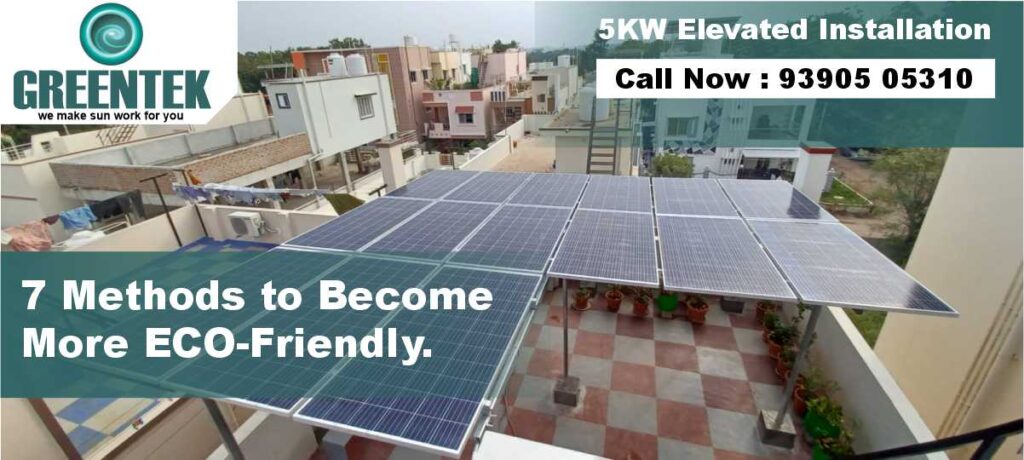
7 methods to become more eco-friendly.
Sustainable living entails living in harmony with the earth’s resources and using them responsibly so that future generations can live healthy and prosperous lives.
This means we must reduce our reliance on fossil fuels and reduce our carbon footprint. You must keep your home in balance by using less energy, water, gas, electricity, and other resources.
Sustainable living also implies that individuals and businesses do not overuse resources for selfish reasons, such as economic gain.
As a result, the term “sustainable living” refers to a concept or belief about how to live more responsibly on this planet. Although the meaning differs slightly, it is frequently used interchangeably with zero waste.
1) Avoid Using Disposable Items
Paper and plastic plates and utensils, disposable diapers, paper towels and napkins, low-cost plastic products, and other non-durable consumer goods (products with a short lifespan) account for a significant portion of the world’s waste stream.
The greenhouse gas emissions produced during the manufacturing and disposal of these products are a major issue. Store a large quantity of long-lasting, low-cost dishes, cutlery, and glassware for parties and picnics. For coffee on the go, use cloth napkins, cloth diapers, cloth rags, rechargeable batteries, long-lasting razors, and refillable coffee thermoses.
2) Make the switch to clean energy.
The most important advantage of solar panels is that it is a truly renewable source of energy. Available in all parts of the world and on a daily basis. Solar energy, unlike other forms of energy, never runs out.
Solar energy is available for as long as the sun exists, so when scientists predict that the sun will die, it will be available for at least 5 billion years.
The electricity generated by the solar power generation system covers a portion of the required energy, lowering the electricity bill.
The amount you can save on your bill is determined by the size of your solar system as well as your electricity or heat consumption.
This transition, for example, is a huge benefit for businesses with commercial solar panels because it can cover the majority of the energy bill with a large system size.
In addition to saving money on your electricity bill, you may be eligible for credits for surplus energy sent back to the grid under state-specific Net Metering Policies. If you produce more energy than you consume (considering that your solar system is connected to the grid).
It has a low maintenance cost, which saves you money on operations.
Solar power systems are typically low-maintenance. It only needs to be kept relatively clean, so a few times a year should suffice. If in doubt, you can always turn to professional cleaning companies, which charge between 25 and 35 euros for this service.
3) Recycle
Recycling helps to balance natural resources, reduce pollution, and conserve energy.
The separation and cleaning of waste to produce “secondary materials,” primarily glass, paper, metal, and plastic, for reuse in products, is known as recycling.
Recycled aluminium, for example, is a particularly valuable raw material. The Aluminum Association claims that manufacturing with recycled aluminium is 92% more efficient than using virgin raw materials. Although recycling accounts for approximately 40% of the country’s aluminium supply, nearly $1 billion in aluminium cans that could have been recycled are discarded each year.
4) Upcycle
Items that are still alive should be reused. The Internet has everything from sophisticated artistic expressions like a chandelier made out of bicycle parts, an aquarium made out of a piano, and a pool table made out of a vintage car to simple DIY projects like spinning a plastic bottle. Everything from planters and wine corks to bath mats and toy organisers is available. This type of reuse does not eliminate the majority of the materials from the waste stream, but because the redesigned objects replace new purchases, it saves energy and reduces the energy required to produce them. lower greenhouse gas emissions
5) Save Water
Water consumption reduction saves energy and infrastructure costs. Water conservation also means that less water is lost to pollution, which helps to ensure a sufficient supply of clean water in the future. You can save water by leaving it outside for a little longer and washing your car on the lawn. When you clean the dishes, brush your teeth, or do general housekeeping. Try it in the shower. Turn on the water to lather, then turn it off while you scrub and rinse. A quick shower is also beneficial.
6) Electric Vehicle
Vehicles account for roughly one-third of all air pollution in the United States. Pollutant emissions pose a greater health risk than chimney emissions because they are closer to where we live, work, and play. According to the EPA, cars and trucks account for 23% of total GHG emissions in the United States, with the average passenger car emitting about 4.6 tonnes of carbon dioxide per year.
Purchasing a fuel-efficient vehicle reduces air pollution and your carbon footprint while also saving you money. The difference in annual fuel costs between a 20 mpg car and a 30 mpg car is about $708, or $3,538 over 5 years.
7) Eat Healthy Food
Limiting your consumption of meat and dairy can help you reduce your carbon footprint. Because the conversion of plant energy to animal energy is inefficient, animal food production emits far more greenhouse gases than grain and vegetable production. Depending on how it is measured, livestock production accounts for about 15% of global greenhouse gas emissions, according to the Food and Agriculture Organization of the United Nations.
To reduce your food footprint, you don’t have to be a vegetarian or vegan. According to the University of Michigan’s Center for Sustainable Systems, eating chicken instead of beef for a year reduces your carbon footprint by 882 pounds, and eating just one vegetarian meal a week can save 1,160 miles in equivalent GHG savings.

